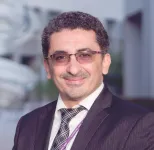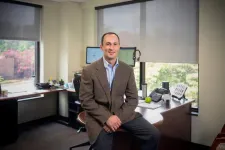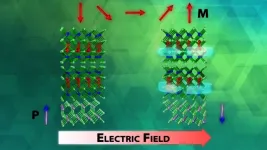(Press-News.org) Scientists studying gene activity data of the early human embryo have discovered an overlooked type of cell which self-destructs within days of forming, as part of a quality control process to protect the developing foetus. The findings give insights on what happens at the very first stages of life after fertilisation which could in the future help improve IVF or regenerative medicine treatments.
A new study published on 20 June 2023 in PLoS Biology by an international team of scientists including researchers at the University of Bath, finds that our earliest development in the womb may be rather different to what we have always assumed.
While human adults are made up of trillions of cells, we all started out as just one cell, the fertilized egg. This divides to become 2 cells which in turn divide to become four, which become 8 and so on. At some point the cells then start to specialise in their function. Like trains sent to different end stations, some will be shunted off to become the placenta while others will become the embryo.
Self-destructing embryonic cell
The team of scientists analysed previously published data on gene activity of each individual cell from 5-day old embryos and discovered around a quarter of the cells didn’t fit the profile of any of the known cell types (pre-embryo, pre-placenta etc).
Investigating further, they discovered that these cells contained so-called “Young transposable elements” or “jumping genes”. These are rogue elements of DNA that can copy themselves and insert themselves back into our DNA, often causing damage in the process.
Staining of embryos by project collaborators in Spain confirmed the existence of the cells with proteins derived from the jumping genes.
Looking a little further forward in time, the team found their descendants both have DNA damage and undergo a process of programmed cell death.
Quality control mechanism
This process, the researchers suggest, looks like a form of quality control: selection between cells in favour of the good ones.
Dr Zsuzsanna Izsvák, co-senior author from the Max Delbrück Center and an expert on mobile DNA, said: “Humans, like all organisms, fight a never-ending game of cat and mouse with these harmful jumping genes.
“While we try and suppress these jumping genes by any means possible, very early in development they are active in some cells, probably because we cannot get our genetic defences in place fast enough.”
Co-lead author Professor Laurence Hurst, from the Milner Centre for Evolution at the University of Bath, said: “If a cell is damaged by the jumping genes – or any other sort of error such as having too few or too many chromosomes – then the embryo is better off removing these cells and not allowing them to become part of the developing baby.
“We are used to the idea of natural selection favouring one organism over another. What we are seeing within embryos also looks like survival of the fittest but this time between almost identical cells. It looks like we’ve uncovered a novel part of our arsenal against these harmful genetic components.”
Using old genetic enemies to fight new ones
Conversely, the single-cell data showed that the key cells that will become the embryo (the inner cell mass or ICM) don’t contain jumping genes but instead express a virus-like gene called human endogenous virus H. This helps suppress the young jumping genes in the inner cell mass, fitting with an emerging pattern that we use our old genetic enemies to fight our new ones.
The authors suggest that if the quality control process is too sensitive, the embryo as a whole may die. This might explain why some mutations in our system to detect damage in early embryos are also associated with infertility.
END
Scientists discover new embryonic cell type that self-destructs to protect the developing embryo
2023-06-20
ELSE PRESS RELEASES FROM THIS DATE:
National Geographic Explorers win award for visualizing arctic climate change
2023-06-20
FOR IMMEDIATE RELEASE: June 20, 2023 - Washington, D.C. - An innovative virtual reality project created by National Geographic Explorers in collaboration with local communities was recognized with the “Best in Category: Visualize” during the XR Prize Challenge: Fight Climate Change earlier this month. The project, “Qikiqtaruk: Arctic at Risk” was selected for the award from across 150 submissions at the Augmented World Expo (AWE) in Santa Clara, California on June 1, 2023.
“Qikiqtaruk: Arctic at Risk” brought together researchers, park rangers, educators and immersive content ...
NYU Abu Dhabi researchers develop first-of-its-kind adhesive bandage that can detect COVID-19 antibodies
2023-06-20
Abu Dhabi, UAE, June 20, 2023: Researchers at NYU Abu Dhabi have developed a new rapid testing method for COVID-19 – an adhesive bandage that relies on gold nanoparticles to quickly detect the immune antibodies in the bloodstream.
These antibodies, named IgM and IgG, are naturally produced as a result of SARS-CoV-2 infection, and therefore serve as valuable biomarkers to identify infected individuals and monitor the spread of pandemics. The innovative bandage technology is affordable and easy-to-use, and ...
Alissa Park appointed Dean of UCLA Henry Samueli School of Engineering and Applied Science
2023-06-20
Ah-Hyung “Alissa” Park has been appointed the Ronald and Valerie Sugar Dean of the UCLA Henry Samueli School of Engineering and Applied Science, effective September 1.
One of the nation’s leading experts on carbon capture and conversion technology, Park is currently the Lenfest Earth Institute Professor of Climate Change and chair of the department of earth and environmental engineering at Columbia University, where she has been a faculty member since 2007. She also is director of the Lenfest Center for Sustainable Energy, an executive committee ...
Research identifies factors that make correcting misinformation about science more successful
2023-06-20
In an article titled “A Meta-analysis of Correction Effects in Science-Relevant Misinformation” published in the journal Nature Human Behaviour, University of Pennsylvania social psychologists and communication scholars Man-pui Sally Chan and Dolores Albarracín explain the circumstances under which corrections of misinformation about science are most likely to work or fail, as well as the characteristics of the corrections most likely to succeed.
The authors conducted a meta-analysis, a quantitative synthesis of prior research, which involved 60,000 ...
Wider access to health insurance via Medicaid expansion improved cardiac care
2023-06-20
Research Highlights:
States that participated in the Medicaid expansion provision of the Affordable Care Act, raising the income level to be eligible for Medicaid up to 138% of the federal poverty level, improved several measures of heart disease care for Medicaid recipients in their states.
In an analysis of 30 studies comparing states that chose to participate in Medicaid expansion with those that didn’t, Medicaid expansion was associated with improvement in insurance coverage for cardiac care, decreased out-of-hospital deaths, fewer socioeconomic and demographic disparities in care and increased preventive care and screening.
Embargoed until 1 p.m. CT/2 p.m. ET, ...
Less-invasive cardiac MRI is a valuable diagnostic tool in the early evaluation of patients with acute chest pain
2023-06-20
WINSTON-SALEM, N.C. – June 20, 2023 – An estimated 3 million patients visit emergency departments each year with acute chest pain and mildly elevated troponin levels. High levels of troponin, a protein, occur when the heart muscle is damaged from a heart attack. How best to evaluate and treat patients with chest pain with detectable or mildly elevated troponin remains unclear.
Now, a new study from researchers at Wake Forest University School of Medicine reveals that cardiac magnetic resonance imaging (MRI), is a safe and valuable tool to help evaluate these complex patients.
The ...
Novel way to manipulate exotic materials
2023-06-20
An advance in a topological insulator material — whose interior behaves like an electrical insulator but whose surface behaves like a conductor — could revolutionize the fields of next-generation electronics and quantum computing, according to scientists at Oak Ridge National Laboratory.
Discovered in the 1980s, a topological material is a new phase of material whose discoverers received a Nobel Prize in 2016. Using only an electric field, ORNL researchers have transformed a normal insulator into a magnetic topological insulator. This exotic material allows electricity ...
Research pilot sets the stage for better, more equitable aortic stenosis care
2023-06-20
DALLAS, June 20, 2023 — New research published today in Circulation: Cardiovascular Quality and Outcomes examines the pilot phase of the American Heart Association quality improvement program Target: Aortic Stenosis™. The program aims to lay the groundwork to more reliably measure performance on the quality of aortic stenosis (AS) care from diagnosis to treatment. The Target: Aortic Stenosis program focuses on closing care gaps for patients who are not appropriately diagnosed and referred for initial ...
Community spaces may promote healthy aging for rural Black, Hispanic adults
2023-06-20
UNIVERSITY PARK, Pa. — Millions of Americans over the age of 65 lack access to the social and emotional support they need for healthy aging, according to the Centers for Disease Control and Prevention. Non-white individuals in rural communities are especially susceptible. New research from Penn State found that the presence of social infrastructure — shared community spaces that are free or low cost to visit — in rural communities may help provide social and emotional support and promote healthy aging among older, ...
Concluding remarks & perspectives of Targeting Phage Therapy 2023
2023-06-20
The 6th World Congress on Targeting Phage Therapy 2023 that was held on June 1-2 in Paris, and gathered more than 150 attendees from 30+ different countries. Targeting Phage Therapy 2023 included more than 71 presentations between major talks, short orals, and posters.
The Chairman of the scientific committee Dr. Marvin Edeas Université de Paris, Cochin Institute, France, and Dr. Domenico Frezza, University of Roma Tor Vergata, Italy, stated: “It’s wonderful to hear that the speakers at the Targeting Phage Therapy 2023 conference delivered excellent presentations on a variety of fantastic topics. The fact ...





